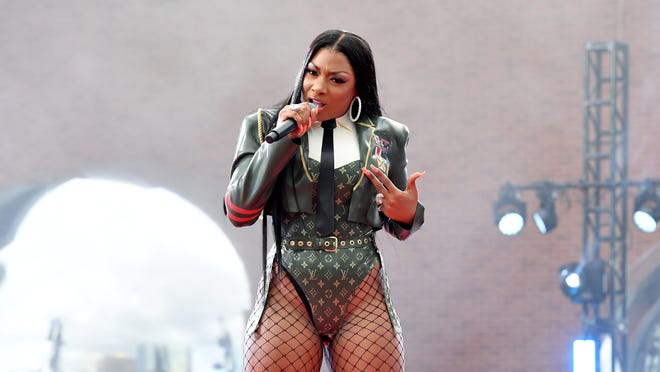
Off the court, the NBA All-Stars could not attend parties, host clinics or even enjoy dinner at a restaurant.
"There’s not a lot of people around. There’s no entertainment," Los Angeles Clippers forward Kawhi Leonard said. "There’s no energy. There’s no excitement."
On the court, the NBA All-Stars still brought excitement and energy through the same methods that have become familiar in other show-case games. Giannis Antetokounmpo threw down endless dunks. Damian Lillard and Stephen Curry drained endless 3-pointers. Neither All-Star teams played much defense.
The NBA held its All-Star game this year in Atlanta with fake crowd noise, an enclosed arena and strict safety protocols to mitigate risk with the coronavirus. Yet, both All-Star teams still offered highlight reels, competitiveness and clutch performances.
LeBron James himself used the All-Star Game as a form of load management by sitting the entire second half. Kevin Durant missed the game entirely because of a left hamstring injury. So other factors influenced “Team LeBron” finishing with a with a 170-150 win over Team Durant.
Antetokounmpo won his first All-Star MVP award by posting a team-leading 35 points on 16-of-16 shooting. Lillard made the game-clinching shot from near halfcourt, which capped a 32-point performance while shooting 11-of-20 from the field and 8-of-16 from 3-point range. And Curry joined in on the long-distance frenzy with 28 points while going 10-of-19 from the field and 8-of-16 from deep.
"The game itself felt the same. The only thing is you can't really see the crowd in normal years like outside of the courtside rows," Curry said. "The energy is definitely louder and more engaged with more people, but the only thing that really was really missing was the who's who sitting down there and just the energy around the court."
In normal times, NBA All-Stars would stay in a host city for three days. They would spend the first days fielding interviews, hosting clinics and making sponsorship appearances. They would spend the next two evenings enjoying the city’s culinary delights, night life and VIP events.
These are not normal times, though. With the NBA hosting an All-Star Game in Atlanta nearly a year after the coronavirus outbreak first started, the league required various protocols that mirrored their resumed season last summer on a campus bubble. All participants had to resume daily COVID-19 testing, mask-wearing and social-distancing practices. They had to stay quarantined at the hotel before the game. And they could only bring a small handful of friends and family.

Hence, Denver Nuggets center Nikola Jokic spent most of his weekend just playing cards with his wife and his two brothers in his hotel room. Others just played video games. James didn’t even bother bringing his family.
"Everyone in basketball in the world usually comes to one city and we all enjoy it," James said. "We all really sit back and think, 'Wow this is really what the game has built. This is a beautiful weekend in all walks, on the floor and off of it.' "
James and other NBA All-Stars hardly felt as nostalgic about Sunday's game. James even called it "a slap in the face" for the league to have an All-Star Game after starting a compressed 72-game season only two months after the Los Angeles Lakers won the NBA title. On Sunday morning, the NBA ruled out Philadelphia 76ers center Joel Embiid and forward Ben Simmons from playing after they were exposed to a barber who tested positive for COVID-19. Although that exposure happened in Philadelphia, that development partly explained why some All-Stars questioned the idea.
Still, the NBA and the National Basketball Players Association pushed forward with the game. They knew it would maximize its television contract and keep its sponsors happy. They knew it would help HBCUs with over $3 million in donations and endless exposure. And they knew that the frustrations would soften once players stepped on the court.
"There's always a lot of back and forth on these different decisions," said Phoenix Suns guard Chris Paul, the president of the NBPA. "But once guys get here, I think they're grateful for it."
The pre-game festivities included Grammy winners singing the U.S. national anthem (Gladys Knight) and Canadian national anthem (Alessia Cara). It featured rapper Common introducing the Clark Atlanta University Philharmonic Society Choir before it performed an original rendition of "Lift Every Voice and Sing." And it showcased the marching bands with Grambling State University and Florida A&M University performing during lineup introductions.
The players could not feed off the energy from a packed arena filled with celebrities and hardcore NBA fans. But they could feed off the 1,500 frontline workers, HBCU students and additional family members that sat inside. They could also hear the fake crowd noise from the virtual fan section that featured 300 frontline workers and HBCU students.
So before the game started, James performed his customary chalk toss. Curry watched with admiration and excitement.
Then, the All-Stars put on a show. Curry, Lillard and Paul rose to each other’s challenges to throw down alley-oop dunks. Antetokounmpo mostly dominated in the paint, but he also banked in a couple 3-pointers. Curry and Lillard drained shots from the logo. Though Curry insisted the plan was not pre-meditated, he tried to clinch the game with a deep 3. Following Curry’s miss, Lillard took the lead in ending the game with his own long-distance heave.
"Given the circumstances with COVID and the kind of season it's been, it was fitting," Lillard said of his game-clinching shot. "We came in last night, I didn't leave the hotel room all day or all night, other than going to test, and they brought the food to us and everything. The game was pretty much it, and watching the skills and 3-point and dunk contests. But it was pretty quick."
Because of that efficiency, some All-Stars came to an unexpected realization. They actually kind of liked this setup better. As Dallas Mavericks guard Luka Doncic said, "it’s better. It’s quicker; you’re in and out."
That hardly describes how it is during most All-Star weekends. Though most players enjoy the brief reunion with other NBA stars and luminaries, all the participants feel pulled in too many directions. They never have enough time to complete that navigation.
When Curry visited his hometown of Charlotte two years ago, the Golden State Warriors star squeezed in visits to his alma mater (Davidson), Under Armour clinics and appearances in the 3-point contest and All-Star Game without much time to actually see his hometown friends and family. This year, Curry appeared in both events without all the added stress.
"The prior experiences are more exhausting. I would love this experience with just fans and more energy around the city and the building but in a safe manner," Curry said. "But having everything in one night was kind of cool."
It goes without saying, however, that the NBA All-Stars never want to have a game like this again. Clarity soon awaits on if the NBA and the rest of the world can return to normalcy after spending the past year feeling far from it.
Follow USA TODAY NBA writer Mark Medina on Twitter, Facebook and Instagram.









